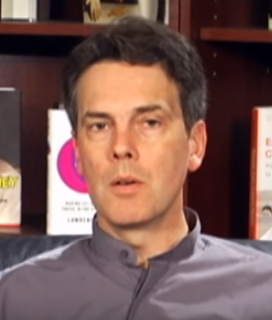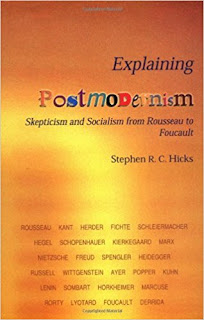

| Online: | |
| Visits: | |
| Stories: |

| Story Views | |
| Now: | |
| Last Hour: | |
| Last 24 Hours: | |
| Total: | |
Professor Hicks: Postmodernism is Leftism
Saturday, April 8, 2017 17:46
% of readers think this story is Fact. Add your two cents.
Professor Stephen Hicks' book, ExplainingPostmodernism: Skepticism and Socialism from Rousseau to Foucault(2011), is used as a springboard in this piece. In other words, this ain't a book review.
Hicks uses the term “postmodernism” throughout his publication; though he's well aware that many of the philosophers and movements he refers to aren't ordinarily classed as postmodernist. That means that 'postmodernism' is indeed a catch-all term whichis used primarily for convenience's sake. Despite that, all the movements and philosophers referred to are postmodernist in a literal sense; even though they aren't seen as being postmodernist in the strictly philosophical sense. More importantly, what united all these seemingly disparate philosophers and movements is that they were all, according to Hicks, left-wing (usually Trotskyist/communist/Maoist/etc.).
In terms of autobiography, Stephen Hicks is a very rare animal indeed: he's a right-wing professoratan American university. He teaches at Rockford University; where he also directs the Center for Ethicsand Entrepreneurship.
When Socialism was Discovered to be Dead or Dying
ProfessorStephen Hicks's central thesis on postmodernist intellectuals is that they recognised that socialism was dead or dying (in the late 1960s, 1970s and 1980s) and thus decided to do something about it. What did they do? They developed their own distinctive “sceptical” (yet still left-wing!) philosophies. In 1974, for example, Marcuse was asked whether he thought the New Left was dead. Hicks quotes Marcuse as replying: “'I don't think it's dead, and it will resurrect in the universities.'”
He was dead right about that!
Of course we can ask Hicks if it really were that simple. Was it really all about revivifying socialism/communism or were there (at least some) other factors involved? Nonetheless, that project might have been in the unconscious minds of these thinkers. Perhaps their upbringings in the theology of socialism left an indelible mark on their psyches; as religious upbringings tend to do.
Philosophy Serves Politics
It can be said that sceptical epistemology, deconstruction, etc. are all means to achieve the political ends which can't be sustained by truth, evidence and argumentation. Thus, if all this is taken as given (as true!), then one's “readings” and epistemologies give one free reign to believe what's required in order to further a political agenda/goal.
If we can be more specific about what postmodernists believe (even if in very broad terms), we can cite the following. Take logic. It's artificial, serves power and is anti-human (Heidegger, Levinas, etc.). Science is theory-laden and “underdetermined by the evidence” (as often said in the philosophy of science). Truth is a “tool of power” (Foucault) and is specific to different “language games” (Wittgenstein, etc.) or “phrase regimes” (Lyotard).
Thus, if, as Fredric Jameson put it (as quoted by Hicks), “all life ispolitical” (therefore all philosophy is also political), then one political tool (if in the guise of philosophy) will be rhetoric (“literature”, in Derrida's case). That means that if no “discourse” reveals the truth (or even attempts to do so, in postmodernism's case), then why not bite the bullet and indulge in an even purer more extreme (philosophical) rhetoric – even if in a poetic and/or pretentious guise?
Thus, as Hicks puts it, “regular deployments of ad hominem,the setting up of straw men, and the regular attempts to silence opposing voices” aren't only legitimate, they're to be encouraged (at least if you're on the same side). Hicks cites the example of Stanley Fish who “calls all opponents of racial preferences bigots and lumps them in with the Ku Klux Klan”. He also cites the radical feminist Andrea Dworkin. She “calls all heterosexual males rapists and repeatedly labels 'Amerika‛ a fascist state”. (So too does Chomsky!) All this, therefore, is simply a variant on the many Leftists who suffer from Tourette's syndrome when they repeatedly and uncontrollably shout “racist”, “bigot”, “xenophobe”, “Nazi”, etc. at literally anyone who dares to oppose them.
But Why Leftism?
Despite all the above, you wouldn't think (on the surface) that most/all of these different philosophers (who rejected truth and reason) would have also flocked to the very same political position – but they did! Or as Hicks puts it:
“Postmodernists are not individuals who have reached relativistic conclusions about epistemology and then found comfort in a wide variety of political persuasions.”
Thus “Michel Foucault, Jacques Derrida, Jean-François Lyotard, and Richard Rorty are all far Left”. And “so are Jacques Lacan, Stanley Fish, Catherine MacKinnon, Andreas Huyssen, and Frank Lentricchia”. Of course postmods may well laugh at what they perceive to be Hicks' lack of discrimination here. So, yes, it's true that all these thinkers were individuals with their own ways of thinking. However, although the parameters they existed within were (relatively!) broad, they were, nonetheless, still circumscribed. That is, “[o]f the major names in the postmodernist movement, there is not a single figure who is not Left-wing in a serious way”. And Hicks concludes that this must mean that “there is something else going on besides epistemology”!
In addition to that, nearly all these intellectuals did indeed begin their lives as outright communists/socialists. Michel Foucault, for example, was a member of the French Communist Party from 1950 to 1953. Jean-François Lyotard was an active member of the Marxist group Socialisme ou Barbarie(Socialism or Barbarism) for twelve years. As for Jacques Derrida, he was a writer for the well-known Maoist Tel Queljournal. (Hicks quotes Derrida as saying: “Deconstruction never had meaning or interest, at least in my eyes, than as a radicalization, that is to say, also within the tradition of a certain Marxism, in a certain spirit of Marxism.”) Richard Rorty's case is less clear cut, both in terms of political activity and ideological allegiance. Nonetheless, he once strongly supported the American Socialist Party, specifically the union leader A. Philip Randolph.
A Deep Faith in Socialism
What was the root of this deep faith in socialism/communism generally? Why didn't postmods, poststructuralists, structuralists, etc. reject it out-of-hand? Hicks believes that there was a religious (or at least a quasi-religious) reason for this.
Leftists have religious sensibilities. They see socialism/communism as the religion that it is. Hicks, specifically, picks up on the psychological root of their religious infatuation with socialism. He writes:
“You feel that socialism is true; you want it to be true; upon socialism you have pinned all your dreams of a peaceful and prosperous future society and all your hopes for solving the ills of our current society.”
Strangely enough, Richard Rorty confessed his deep faith in Leftism in that he advised Leftists to ignore socialism/communism's bloodthirsty history. Thus Rorty, as quoted by Hicks, said:
“I think that a good Left is a party that always thinks about the future and doesn’t care much about our past sins.”
Now isn't that exceedingly convenient?
That means that the Left can conveniently erase Lenin, Stalin, Pol Pot, etc. from the socialist picture. (As Stalin himself erased various political enemies from official Soviet photographs.) The socialist future of Leftists is a perfect and Utopian future. The socialist past, as we know, is blood-soaked. Thus the socialist past never guides the future: it is erased or denied. To the Leftist, no “actually existing” regime was ever theologically/truly socialist.
So what happens when socialism fails,both practically and theoretically? Then there's “a moment of truth for anyone who has experienced the agony of a deeply cherished hypothesis run aground on the rocks of reality”. So what did Leftists do then?
According to Hicks, these despondent Leftists chose postmodernism because
“[p]ostmodernism is the academic far Left’s epistemological strategy for responding to the crisis caused by the failures of socialism in theory and in practice”.
In other words, because, at that time (the early 1970s to the 1980s), hardly anyone (save students and academics) bought socialism/communism any more, such a thing had to be sold in another form. It had to be defended with different theoretical and philosophical weapons. Of course many people did stick with various old-style socialisms/communisms. However, this wouldn't have been an option for the aforesaid intellectuals. Such people simply wouldn't have allowed themselves to sing exactly the same tune. Thus they offered variations on it, in many different keys.
************************************
Once again, it may seem like a stretch of the imagination to say that Foucault, Derrida, Lyotard, Rorty, etc. were all outright socialists or communists. That's because – depending on how we take the word “outright” – they weren'toutright communists/socialists. How could they have been when communism/socialism had proved – countless times and in countless ways – to be such an abject failure? Instead, they took Leftism in different directions, This, for them at least, was a very wise thing to do.
So despite the irony, the “play of the sign” (Derrida), the scepticism, relativism, etc., postmodernists are still committed to a determinate politics with determinate causes and goals. Not only that: their politics and those causes and goals are invariably left-wing in nature.
Source: http://theenglishdefenceleagueextra.blogspot.com/2017/04/professor-hicks-postmodernism-is-leftism.html




